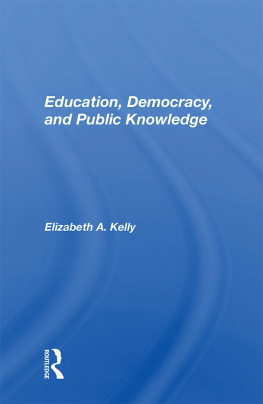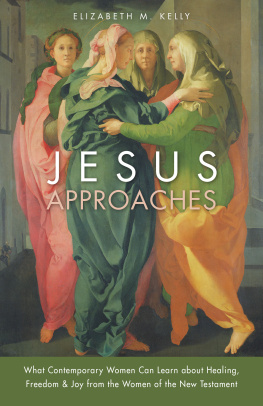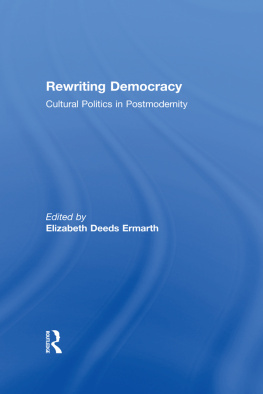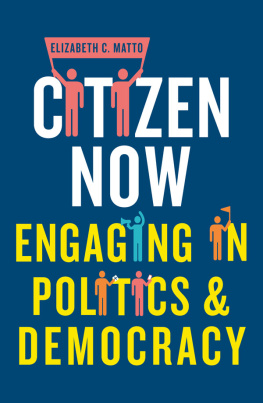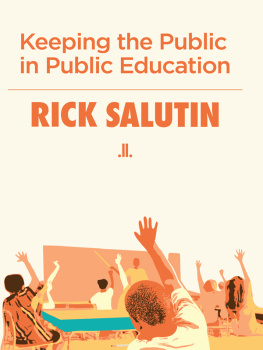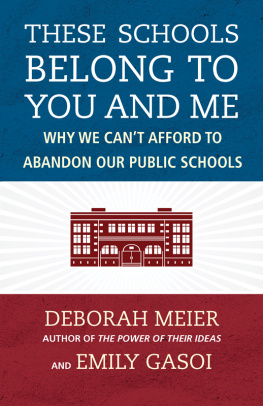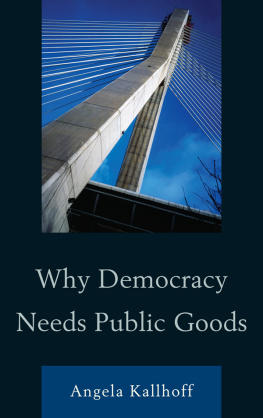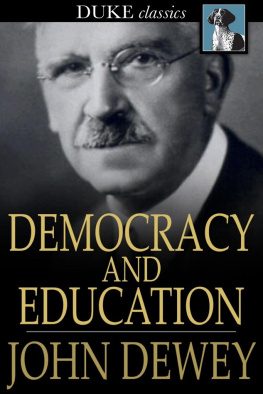Interventions Theory and Contemporary Politics
Stephen Eric Bronner, Series Editor
Education, Democracy, and Public Knowledge, Elizabeth A. Kelly
Unequal Struggle: Class, Gender, Race, and Power in the U.S. Congress, John C. Berg
The Revision of Psychoanalysis, Erich Fromm
Corporate Society: Class, Property, and Contemporary Capitalism, John McDermott
Television and the Crisis of Democracy, Douglas Kellner
FORTHCOMING
Social Regulation and the State, Charles Noble
Technical Fouls: Democracy and Technical Change, John Kurt Jacobson
Crises and Transitions: A Critique of the International Economic Order, David Ruccio, Stephen Resnick, and Richard D. Wolff
First published 1995 by Westview Press, Inc.
Published 2018 by Routledge
52 Vanderbilt Avenue, New York, NY 10017
2 Park Square, Milton Park, Abingdon, Oxon OX14 4RN
Routledge is an imprint of the Taylor & Francis Group, an informa business
Copyright 1995 Taylor & Francis
All rights reserved. No part of this book may be reprinted or reproduced or utilised in any form or by any electronic, mechanical, or other means, now known or hereafter invented, including photocopying and recording, or in any information storage or retrieval system, without permission in writing from the publishers.
Notice:
Product or corporate names may be trademarks or registered trademarks, and are used only for identification and explanation without intent to infringe.
Library of Congress Cataloging-in-Publication Data
Kelly, Elizabeth A.
Education, democracy, and public knowledge / Elizabeth A. Kelly.
p. cm. (Interventions)
Includes bibliographical references and index.
ISBN 0-8133-1633-2 ISBN 0-8133-1634-0 (pbk.)
1. Socialism and educationUnited States. 2. Critical pedagogy
United States. 3. EducationUnited StatesPhilosophy. 4. Public
schoolsUnited States. 5. Politics and educationUnited States.
I. Title. II. Series: Interventions (Boulder, Colo.)
LC196.5.U6K45 1995
370.1dc20 94-27496
CIP
ISBN 13: 978-0-367-00489-7 (hbk)
This book is dedicated to William T. Daly, an exemplary educator, mentor, and friend. In and outside of the classroom he is a model to emulate; for over twenty years he has inspired me personally and professionally. Were it not for his care and concern I would probably not have finished college. Thank you, Bill, for all that you have taught and shown me. Warm thanks are also due to Stephen Bronner, matchless adviser, mentor, friend, and critic, without whose guidance and support I would never have begun, let alone completed, this book.
I have been blessed with many memorable teachers and colleagues at several institutions, all of whom have influenced my thinking and teaching. I wish I could thank each one personally; if I tried, the list would probably be longer than this book. I must single out for special thanks Myron Aronoff, Dennis Bathory, and W. Carey McWilliams, all of the Political Science Department at Rutgers University, whose comments were most helpful at an early point in this project. In a variety of ways, each of them made it possible for me to continue writing at moments when it would have been easy to give up. Long ago and far away at Stockton State College, Joe Walsh and Allen Lacy spent hours outside of the classroom discussing philosophy and social problems with me. I have not forgotten our conversations; indeed, some of the ideas expressed in these pages had their genesis over coffee in the G-wing cafeteria.
Since coming to DePaul University in 1992 I have received warm welcomes and ongoing support from several colleagues, most notably Chris Mobley and J. Harry Wray of the Political Science Department; Sandra Jackson and Jos Solis of the School of Education; Associate Dean Lynn Narasimhan of the College of Liberal Arts and Sciences; and Marjorie Piechowski of the Office of Sponsored Programs and Research. Others in the Political Science Department, the Women's Studies Program, and throughout the university have contributed to the creative, challenging, and supportive institutional environment within which I completed this project.
The members of my writing group, Frida Furman, Mechthild Hart, and Kate Kane, have individually and collectively provided careful readings, cogent criticisms, and more moral support than I would have believed possible. There has also been rich, deep laughter when the work was done. A loving toast to you, my friends.
My students at Stockton State College, Rutgers University, Vassar College, and DePaul University have been my best inspiration; thanks to all of them for reminding me, over and over again, just why I became a professor and how much I love my work.
At Westview Press, Spencer Carr, anonymous readers, and an incredibly helpful, patient, and friendly staff have been a joy to work with. My gratitude to you is unrestrained.
I have been especially lucky to have loving friends and family, without whom my life and work would be empty. My mother, Maude Kelly, has encouraged me throughout years of graduate school and professional life, at times providing support from limited resources at no small personal sacrifice, Her generous heart has sustained me during dark times. Ila and the late W. Scott Burman both showed me, at an early age, that some of the best education takes place outside the classroom. Their abiding friendship and support over several decades is something I will always treasure. Our kinship may be Active, but it is nonetheless dear.
Linda Williamson Nelson, "sister-friend" without equal, intellectual companion, and constant source of encouragement, has been at my side throughout this work despite the distances that have separated us. She has given wise counsel at points of crisis, patiently talking me through bouts of writer's block, and she has the phone bills to prove it. Uma Narayan has offered unstinting support, stimulating conversation, critical vision, and profound sillinessalways perfectly blending the sublime and the ridiculous. Vicki and Norm Ervine have simply been there, through all the highs and lows of the past twenty years and more, offering love and friendship without qualification. So has Kevin Cathcart, to whom I owe much more than words can capture. I cannot imagine life without them. Nor can I imagine having survived graduate school without the friendship and support of Michael Forman, who read and commented on an early version of the manuscript at a time when he should have been working on projects of his own. John Martin, T Regan, and John Vail have been exemplary friends over the years; time spent at Rutgers would have been far less easily borne without these good comrades.
Carl Larsen has been a strong and steady force behind my sometimes wavering commitment to this project. He has put up with innumerable complaints, fears, frantic phone calls, and Internet messages with steadfast grace. He believed in me (and this book) even when I sometimes lost sight of my goals. His willingness to give time, compassion, and spirit has known few limits; my gratitude to him is beyond measure. I cannot count the ways in which our friendship is precious.


